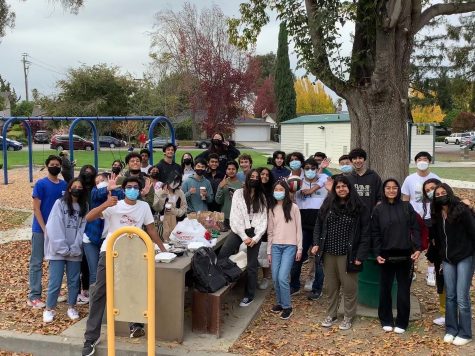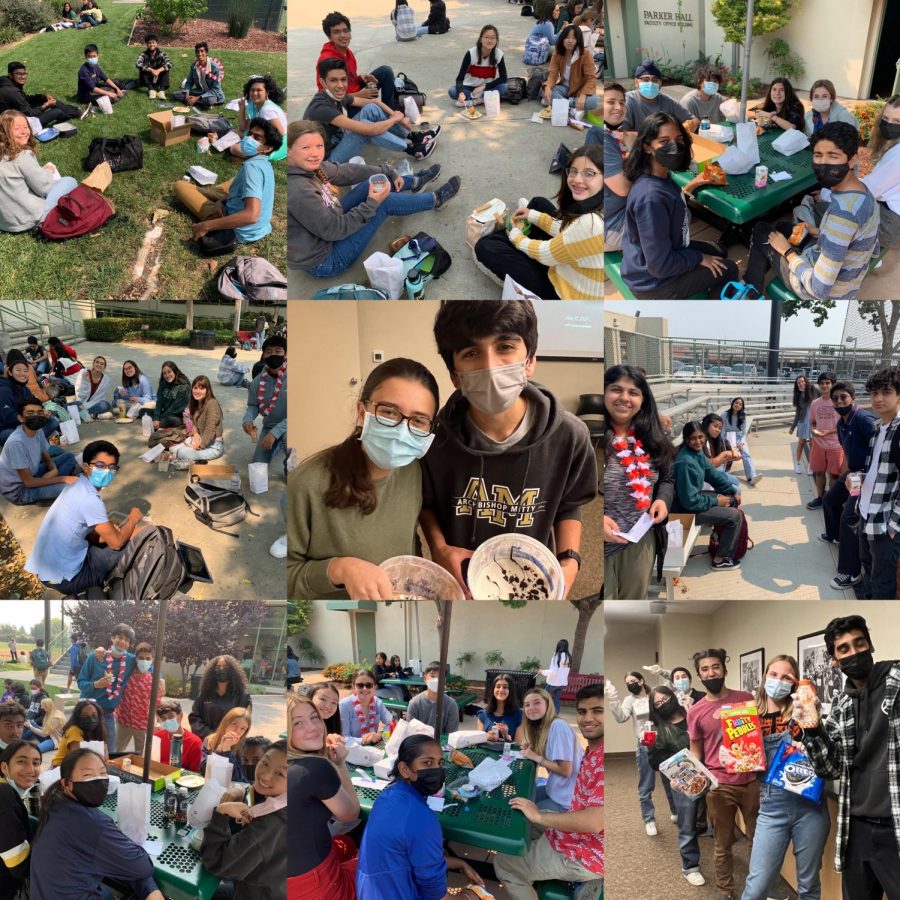Speech and Debate Demystified
What it’s like to be a part of one of the largest extracurricular activities on campus.
Face to face. Two on two. The tension is undoubtedly high. Adrenaline pulses throughout the brain, attempting to gather your thoughts. The other team speaks and you try to adjust your counter-arguments to cater to their point. This goes on back and forth for a solid ten minutes, hand ready on the despised “unmute button,” and finally, you sit there anxiously waiting for the judges’ results.
Only a single course at Archbishop Mitty offers this intellectual exercise: Speech and Debate—one of the largest extracurricular activities offered here. Members of the Speech Team and Debate Team alike are constantly preparing and rehearsing, both in their class and during after school practices. Competing in seventeen separate events ranging from interpretive acting all the way to argumentative debate, Mitty Speech and Debate dives deep into the fundamentals of how to convey points effectively and research them as well as further elaborating on those skills through tournaments.
Before the Competition
Speech and Debate, similar to other performing arts such as theater or orchestra, has arguably most of its workload prior to the competition. The Mitty Speech Team frequently labels their events as “passion projects” due to the creative freedom they allow. Participants focus on developing their speeches surrounding topics they care deeply about, whether that be current social justice issues or even their favorite movies and TV shows. “All of the twelve speech events teach different skills and are fun for unique reasons,” Mrs. Karen Cruz, Director of Speech and Debate expresses.

On the other hand, in Debate the main concentration in policy debate revolves around a broad topic to argue about. The team is expected to compete in subtopics on policies that relate to the aforementioned main topic. The topic this school year focuses on is water protection. There are two sides, the affirmative, which supports a certain policy, and the negative which is developing points that go against the guideline.
To prepare for the debate, the team needs to prepare for being both the affirmative in one round and the negative in another. They research three subtopics to argue for and, likewise, need to be ready to speak against any other three subtopics that other teams they are up against can argue in favor of. In other words, it is much harder to prepare to go against subtopics as they can be selected from a wide range of policies. The Director of the Debate program, Mr. Mark Woodhead, states: “We will start doing practice debates and a final fumble wrap up practice debate right before the next competition on that topic. It generally takes about a week or a week and a half to prepare.” All of this intense preparation finally leads into the competition itself.
During the Competition
Once the competition is underway, nerves are understandably high. According to Mr. Woodhead, “The kids definitely are nervous before every competition. It never goes away. Public speaking I think is the number two fear of all Americans.” He explains that students can harness their nerves to motivate them to prepare more and to have thorough knowledge of the topic they will debate.
Regarding nerves, freshman Speech student Emma Lee explains, “I’m pretty nervous, but I think no matter how I do I’m there to have a good time. I’m there to improve, right? I think in that sense, it’s exciting to be there.” Tamilyn agrees, adding that “the amount of hard work you put into preparing for these tournaments takes a lot of time and you want to see the results.” To deal with these nerves, Tamilyn likes to “read before rounds or listen to music—loud, hype up music because it makes the stress go away.”
After the Competition
In Debate, once the competition has ended, a virtual awards ceremony is held for the contestants. As soon as the ceremony ends, students all join a Zoom room hosted by Mitty Speech and Debate and talk about the tournament, such as what went well and what didn’t. Students also may split off into their specific event groups to talk more about their specific experiences. Afterwards, the students congratulate each other, and give flowers to those who have done exceptionally well.
In both Speech and Debate, at their next class, which is on campus in person, they devote the entire period to reflecting on the tournament. Students are allowed to share their individual experiences and frustrations, such as “…what you learned, how you’ve grown, and [using] that to inspire others to also see the bigger picture,” Mrs. Cruz elaborates. “We call these reflection circles the true awards ceremony, because the intangible trophies, the life lessons they provide, shine brighter and last longer.”
Mr. Woodhead also explains how these reflections can be comforting to students with insecurities about the competition: “So if they didn’t do well, they’ll be like, ‘You know, I was really disappointed in myself.’ And saying that amidst peers, many of whom had those same feelings and experiences can make the debaters feel not so alone . . . It kind of creates a bond between competitors because they realize they’re not in it alone and that other people go through the same things.”
Recent Competitions
Speech and Debate competitions recently took place in Santa Clara and Chicago Glenbrooks. These competitions usually are held in person, but due to the COVID-19 pandemic, all of the competitions have moved online.
Still, the pandemic has made competitions difficult for the team. Emma says, “Now you’re on a Zoom meeting with one judge, and five other competitors. You don’t get nearly as much of the energy when you’re online when you’re not performing live.”
Speech and Debate is a class which requires hard work and commitment. Members spend hours researching, studying, and memorizing their topics, then spend class time reviewing and practicing their points. All of this preparation builds up to competitions, where students have to overcome the fear of public speaking and show off all of their hard work. Afterwards, they celebrate their efforts and reflect on how they can improve. Even in the face of challenges, such as a pandemic that forces them to hold tournaments virtually, they persevere, continuing to work hard and perform in competitions.


